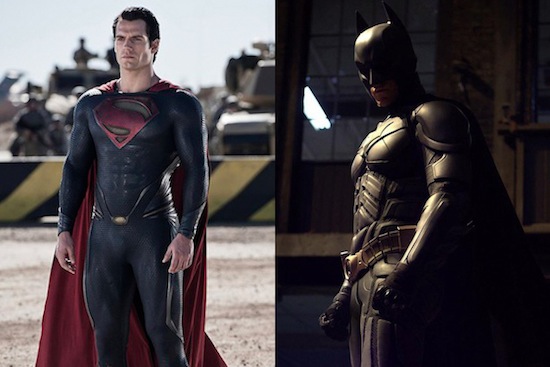
Some people worship the old gods -- supreme beings scattered across Western and Near Eastern civilization -- like Allah, Jesus and Yahweh, while others embrace the Eastern gods, like Gautama Buddha and Krishna. Regardless of your religious affinities, or lack there of, it might surprise you to learn that the gods of the American pantheon did not originate in the lands of our ancestors. They have been revealed to us, in fact, through the pages of comic books, and on the silver screen.
You might pray to Allah or Jesus in times of need, but when you're in a real fix, Superman is the larger than life character you'd probably like to call -- assuming he wasn't a fictional character. When the Man of Steel catches a woman in midair, plummeting off a tall building, or prevents an airliner from crashing into the ocean, his good work is clear and tangible. No abstract interpretations of "God's will" necessary.
The Birth of the American Gods
In Neil Gaiman's wildly entertaining novel, American Gods, the deities of ancient mythologies battle against the "American gods" of modernity and technology. While the novel raises interesting questions as to the power of belief, the transmission of cultural traditions across distance and time, and the nature of worship, it doesn't touch on the gods and demigods that have ruled over the hearts and minds of Americans for generations. If sheer admiration, and consumer indulgence expressed at the bookstore and record breaking movie premiers (The Avengers, The Dark Knight Rises, Spider-Man) are any indication of where citizens place their hopes and dreams, then the foundation blocks of the Great American Church belong to DC and Marvel.
Stan Lee, creator of the Incredible Hulk (co-created by Jack Kirby), Iron Man, Spider-Man and many others, is to the American public what the Titans were to the Greek Gods. He is the father of the modern mythological imagination, which has roots in the heroic myths of the Greeks, as well as the American expansion West and the ideal of the lone gunslinger, hopelessly outnumbered, defending those unable to defend themselves. Of course, Stan Lee isn't alone in his artistic endeavors. Bob Kane and Bill Finger created the brooding mortal, Batman, a dark hero aspiring to superhuman abilities, while Jerry Siegel and Joe Shuster gave us the most enduring American icon of all, Superman.
All fanboy geekdom aside, I understand that for the devout (although perhaps less so for the children of the devout), Batman and Superman hold far less spiritual significance, if any, than Allah, Buddha, Jesus, or whoever their lord happens to be, yet there are some striking parallels. Superheroes function as role models for society. They punish those who would do evil among us, while inspiring others to do better in an unfair world, plagued by murder, racism and abuses of power.
As corny as this next statement is going to sound, I'm going to say it anyway. These fictional men and women, who wear inappropriately tight-fitting spandex costumes, and only exist in our imaginations, bring hope to millions of real people on a daily basis, and by doing so, have become an integral part of American cultural life and identity.
The Gods in All of Us
Like the Greek deities who sat atop Mount Olympus, although unlike the god found in the Bible, Koran and Torah, superheroes are imperfect. They often stumble and fall, and in many ways, despite their remarkable abilities, resemble the people they're trying to protect.
I'm not the first to draw parallels between superheroes and the gods. The Italian writer Umberto Eco wrote about Superman's qualities as a mythical figure, and how readers identify with his strong moral character, and his transformation from a bullied mortal (Clark Kent) into a nearly indestructible being. Even Superman's archenemy Lex Luthor has referred to him as a "golden god."
In the early nineties, Superman died, and was then resurrected in a comic book series now entitled The Death and Return of Superman. In this story, we learned that a godlike superhero could pass away, just as men do, but still hope for life after death, or at least something beyond the disappointments of the mortal world. Like the gods Dionysus, Jesus and Osiris, a dying superhero can be reborn and transformed into something greater than his or her previous incarnation. Here is the oft-repeated myth of resurrection, which spans continents and millennia, telling us that there is always a chance for something new, and perhaps better.
New Gods for a New Society
The United States, at its best, is a nation that reaches for the stars. The immigrants who came to this land brought with them their dreams and their religion, yet somehow these old gods, born in the desert thousands of years ago, weren't enough to satisfy the mythical imagination of a burgeoning new society. Thus, the American gods were born, with some help from the old gods (Marvel's Thor is a good example), allowing the populace, and the world in general, to examine America's far-reaching dreams, and its insecurities (often in the guise of supervillains) as plainly as possible, while keeping the old gods from getting in the way. This isn't to say people stopped believing in the old gods, but evidently they needed something more to match pace with their wild and modern imaginations.
American gods are flawed, but that's all right, because so are we. Even when our comic book champions are afflicted by doubt and weakness, a small part of them usually recognizes that a better path exists. The superhero's journey is, in essence, our own, representing our faults, the best in all of us, and the potential of what we can become.
